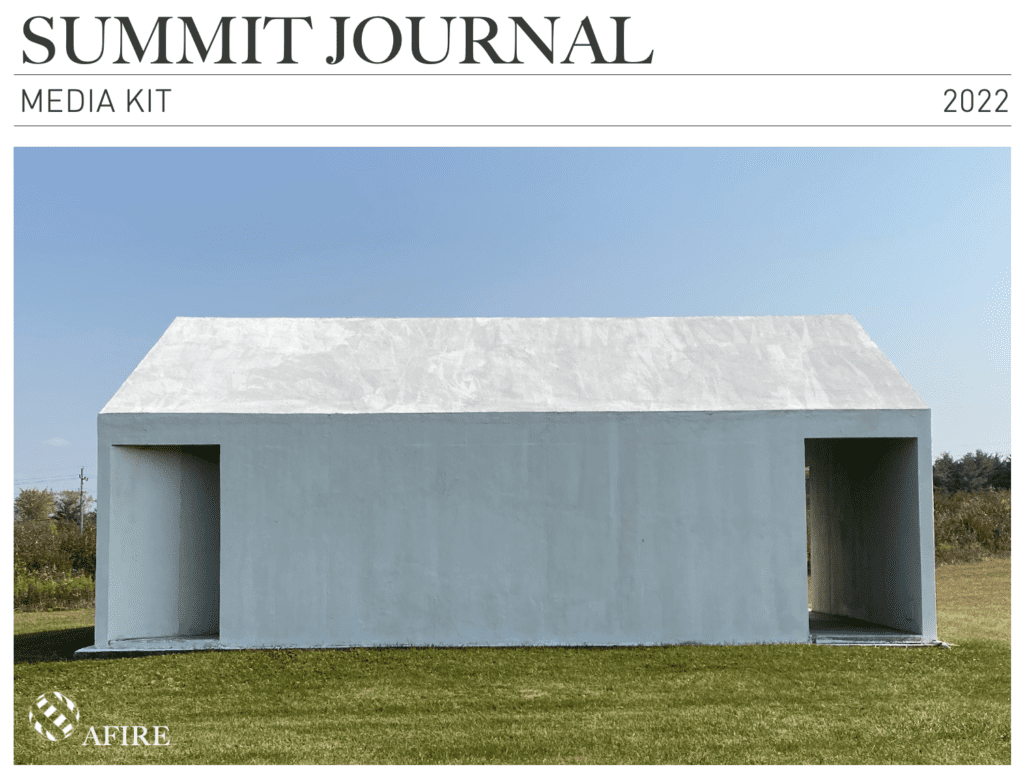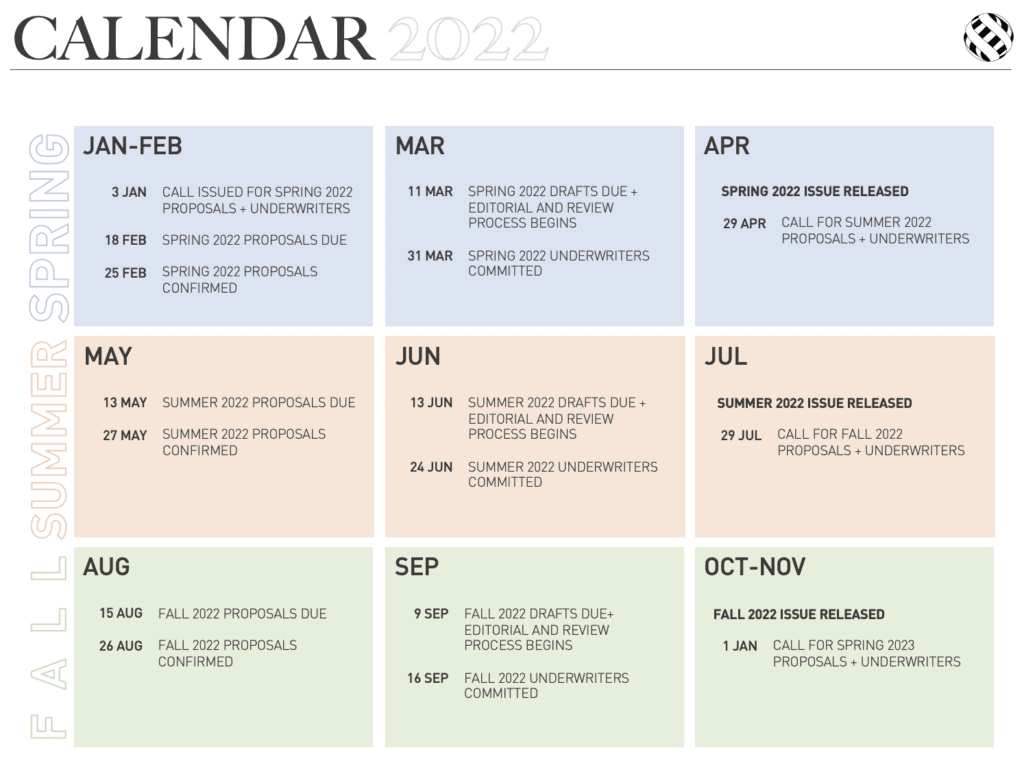Click here to submit (opens in new tab).
Proposals can be submitted as narrative descriptions, outlines, abstracts, completed projects, or other format.
The deadline for proposals is February 18, 2022.
Decisions will be announced by the end of February 2022.
This is an open issue with a broad theme focused on the future of global commercial real estate investment. Topics may include:
- Advancements in social and governance principles related to ESG
- Remote workforces and the future of commercial office properties
- Demographics, migration trends, and US census issues
- Diversity and equity ideas for businesses and investment decisions
- In-depth look at property types (e.g., industrial, retail, multifamily, etc.)
- Geopolitics, comparative analyses of real estate investment by country, etc.
We are particularly interested in informed ideas, research, and analyses that provide original insights on regular topics—and especially those ideas that challenge popular assumptions.
Both original articles and reprints are accepted, rights permitting.
Authors retain content ownership, subject to AFIRE’s copyright policy and other guidelines.
(Opens in new tab)


READ THE LATEST ISSUE (FALL 2021)

ALSO IN THIS ISSUE (FALL 2021)
NOTE FROM THE EDITOR / GROUPTHINK VS. GROUP COLLABORATION
AFIRE | Benjamin van Loon
MID-YEAR SURVEY / CHECKING THE PULSE
No matter your age or experience, 2021 has shaped up to be a year that no one can forget. Findings from the AFIRE 2021 Mid-Year Pulse Survey detail a cautious road ahead.
AFIRE | Gunnar Branson and Benjamin van Loon
CLIMATE CHANGE / REASSESSING CLIMATE RISK
The commercial real estate industry may not yet fully grasp the actual relationship between climate risk and asset pricing and value. But the knowledge is coming fast.
York University | Jim Clayton
University of Reading | Steven Devaney and Jorn Van de Wetering
Kinston University | Sarah Sayce
UNEP FI | Matthew Ulterino
NON-TRADITIONAL / THE ALLURE OF SPECIALTY SECTORS
Real estate investments have historically coalesced around common property types—but it may make sense for investors to reconsider specialty property sectors in the post-COVID world.
Invesco Real Estate | David Wertheim
NON-TRADITIONAL / NON-TRADITIONAL IS GOING MAINSTREAM
The mainstreaming of nontraditional property types is well on its way within institutional investing, which will materially broaden the real estate investment universe.
Principal Real Estate Investors | Indraneel Karlekar, PhD
DIGITAL INFRASTRUCTURE / DIVERSIFYING INTO DIGITAL
As investors look for sustainable sources of inflation-protected yield, real estate investment is increasingly blurring into a wider range of “digital” real asset investment strategies.
AECOM Capital | Warren Wachsberger, Josh Katzin, and Corbett Kruse
LIFE SCIENCES / TAPPING INTO BIOTECH
Over the past two decades, the single-family rental industry haLife sciences real estate has been a “hot” property type for the past decade—and even more since the pandemic. Will all the capital targeting the space be placed where it needs to go?
RCLCO | William Maher, Ben Maslan, and Cecilia Galliani
ESG + CLIMATE CHANGE / HIGH-WATER MARKS
Interest and excellence in ESG performance is becoming increasingly critical to portfolio strategy. So with sea levels on the rise, how can portfolios stay above water?
Barings Real Estate | Jerry Speltz
ESG + NET-ZERO / VALUING NET-ZERO
With more tenants focusing on environmental targets, the burden to reduce direct emissions places increased pressure on investors, who are at a pivotal moment in ESG strategy.
JLL | Lori Mabardi, Emily Chadwick, and Eric Enloe
ESG + FAMILY OFFICE / FAMILY OFFICES AND ESG
As sustainable investing continues to grow in popularity, family offices have taken note—and understanding ESG targets and regulations will be key for longterm performance.
Squire Patton Boggs | Kate Pennartz and Rebekah Singh
DEBT / WHY DEBT, WHY NOW?
Debt funds remain a comparatively small part of the real estate investment market, but they have been gaining in prominence in recent years.
USAA Real Estate | Karen Martinus, Mark Fitzgerald, CFA, and Will McIntosh, PhD
MIGRATION / MIGRATION IN REAL TIME
As the public health situation started to improve in early 2021 and the economy reopened, did migration flows change too—and what if we are able to answer this in real time?
Berkshire Residential Investments | Gleb Nechayev
StratoDem Analytics | Michael Clawar
URBANISM / DOWNTOWN DISRUPTION
The pandemic-driven changes to downtown areas and central business districts is changing the geography of institutional investment. What else changes because of this?
Drexel University | Bruce Katz
FBT Project Finance Advisors + Right2Win Cities | Frances Kern Mennone
WORK-FROM-HOME / CHOOSING FLEXIBILITY
Employees are increasingly demanding flexibility and choice for where (and when) they work. What strategies can landlords implement to adapt?
Union Investment Real Estate | Tal Peri
TALENT AND RECRUITMENT / TALENT PARITY
To be better prepared for future risks, firms need diverse talent. So is the goal of 50% female representation achievable in global real estate investment and asset management firms?
Sheffield Haworth | Isabel Ruiz
CLIMATE CHANGE / PREDICTING THE CLIMATE FUTURE
We are all invested in the cities, assets, and infrastructure of tomorrow, even if we might not live to see the ten largest cities in 2100. But understanding climate change can get us closer.
Climate Core Capital | Rajeev Ranade and Owen Woolcock

